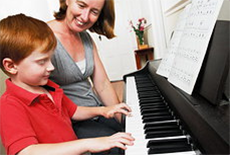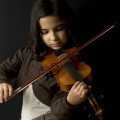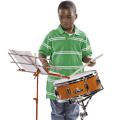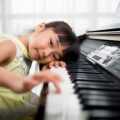 I started piano lessons when I was 3 years old, when I was still talking gibberish. In retrospect, I think I could have waited a year or two to start piano lessons. I wasn’t ready emotionally, but my mother, being an eager parent, felt the earlier the better.
I started piano lessons when I was 3 years old, when I was still talking gibberish. In retrospect, I think I could have waited a year or two to start piano lessons. I wasn’t ready emotionally, but my mother, being an eager parent, felt the earlier the better.
As a piano teacher today, I am often asked the question: what is the best age to start piano lessons? Generally speaking, I would recommend ages 4 or 5 and older—but since every child is unique in his development and abilities, I would advise you to review the following.
Emotional readiness:
Emotional maturity is necessarily because learning to play the piano requires patience, concentration and repetition. The student should be able to sit still and focus for at least 30 minutes. It is best if your child has indicated some desire to learn piano. If the interest is generated by the parent, younger students have been known to lose interest more quickly than if they expressed desire to try the instrument themselves.
Mental readiness:
All music is made up of notes and every note has a letter name. In order to properly grasp the concepts of music, younger children will need to be able to read and comprehend the alphabet.
In addition to understanding the alphabet, numbers and counting are a concept that students will also need to understand. Counting is necessary to learn the concept of rhythm and beat. Understanding the difference between different numbers will help them to understand the difference between different note values and rhythmic patterns.
The student should be able to process more than one concept at a time. Learning to read written music is a fairly sophisticated process. A student will be learning to read the notes, figure out the rhythm and translate that to the finger movements. Focus is an integral part of learning any instrument, as is being able to listen and follow directions that the teacher gives and complete the tasks given.
Physical readiness:
Young children will need to have fine motor skills, such as the ability to use small muscles, specifically their hands and fingers to play a piano effectively and learn the proper techniques. The student should also have some basic hand-eye coordination, meaning they are able to coordinate the information received through the eyes to control and direct the hands.
Parental readiness:
Parental support and willingness to help the child out is an important element. Parents who are willing to spend time working with their children to develop a daily practice routine will help them to excel faster and keep the child motivated to continue learning the instrument.
All these factors should be considered when deciding if your child is ready to begin piano lessons. Children who are developmentally and mentally ready will have greater success and more satisfaction with the process of learning to play the piano.








My husband can play the piano (with music only) and sing. My mother started me with piano lessons when I was in elementary school. It was always difficult for me. I could play by memorizing where my fingers went on the keyboard. I disliked music theory, also. After years of this, I finally broke down and cried to the piano teacher I had then and told her I couldn’t do it anymore. At one point I had a concert pianist as a teacher and he informed my mother, in a nice way, that it wasn’t the best choice for me and his conscience dictated that if she insisted on me continuing with piano lessens she should find another teacher. Of course she didn’t listen. Our daughter wanted to take piano lessons, but didn’t have the interest or dedication to practice and do music theory, so I stopped the lessons quickly. We have a granddaughter growing up and I would like to give her piano and/ or vocal training only if she had the patience, maturity, skills, and dedication to either or both. Your article helped me tremendously. I hope more parents can read your advice. It’s wonderful if your child/grandchild really has the desire and commitment for this training they and everyone else will benefit from it. God bless you. I know you have students that treasure your instruction and passion for the piano. The musical arts are just as important as math or reading. I love Opera and try to watch it as much as possible on TV. God gave me other talents, it just wasn’t playing the piano.
Music is that which will be along with us in our entire lives throughout the course of our lives. Music brings us immense joy and makes us move emotionally to another space which can be hard to reach otherwise. Learning to play the piano or learning to play any piece of music helps to develop a long-term love for music. Piano music can be a way of expressing your thoughts as well as emotions through the instruments.
Thanks for sharing. I am 55 and trying to learn the piano.